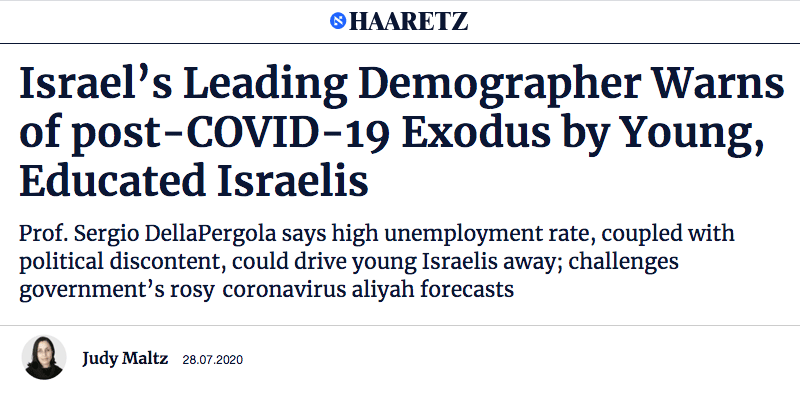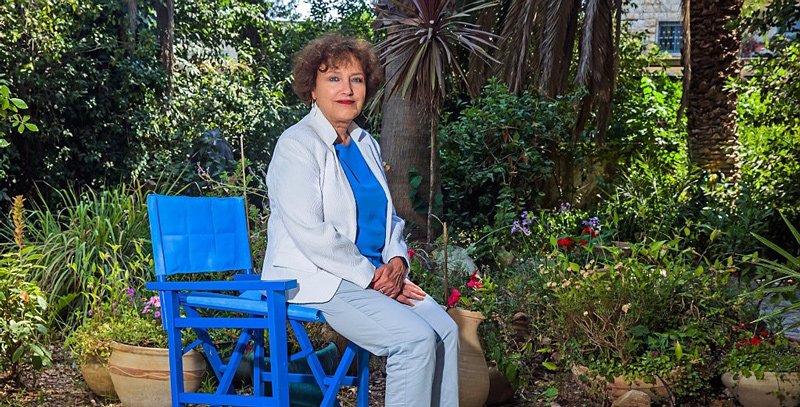

As the coronavirus crisis in Israel continues virtually unabated, experts in Israel’s various government ministries continue to clash with elected officials about how to allocate resources to address the economic fallout, which has left a quarter of the workforce unemployed and demonstrated the lack of solutions available to small business owners and the self-employed whose income was shut off as broad sectors of the economy – tourism, events, hospitality – shut their doors.
Israel Hayom sits down with former governor of the Bank of Israel Karnit Flug, who currently serves as Vice President for Research at the Israel Democracy Institute and a professor in the Economics Department of the Hebrew University of Jerusalem, to discuss her assessment of the mistakes that have been made and some of the good things that could emerge once the crisis is behind us.
Q: It appears as if we’re seeing unprecedented tension between elected officials and the professional functionaries. Are remarks like ‘Just so we don’t wind up like Venezuela’ appropriate when talking about the original plan for distributing financial assistance ?
“I won’t touch on one remark or another, but it’s very important that the experts feel free to express their professional opinions. Yes, elected officials are the ones who ultimately make the decisions, but it’s important that they be based on open, candid discussion … Poorer decisions are made when the professionals cannot express their stances.”
Israel Hayom asks Flug about the updated plan for grants, which was approved on Sunday and under which the country’s highest earners and highest-paid public servants will not receive money, and citizens who fall into certain categories (the disabled, those on income assistance, etc.) will receive more.
“I’ll begin by saying that the problem with the original 6 billion-shekel [$1.76 billion] plan, as it was first presented, wasn’t that there is no money, it was that it was a bad plan, unfair and inefficient. It gave the same amount to those hurt by the crisis and those who were not, to those who need money and those who don’t, and also wouldn’t have led to any major increase in consumption. Anyone whose income wasn’t affected and isn’t low in the first place won’t spend more because of a grant like that.
“In the deep crisis we find ourselves in we will spend a lot of money, the public debt will rise significantly. At some stage, it’s possible that investors who buy bonds will ask themselves if the policy makes sense, or is irrational – and then they could see the bonds as high-risk, and the interest will rise. We can’t get to that point. It’s vital that policy be effective and rational, but it appears as if in some decision-making processes aren’t rooted in economic interests, but rather in a desire to placate the public or minimize protests.
“We are working on policy steps that are enormous, and talking about 6 billion shekels as if it were pocket change. Six billion! This public money should be treated as sacrosanct. Everything we’re doing now should be done in a big way, but we’ll have to pay for it.”
Q: Every other way of distributing aid grants entailed bureaucracy.
“The only advantage to this plan, maybe is that it’s fast.”
Flug says that generally speaking, Israel has managed the entire coronavirus crisis in a very centralized manner, which she says has led to “many mistakes.”
“The right thing to do would have been to extend authority to other entities. The most problematic aspect was the public health one, when no system of contact tracing was put in place to cut off outbreaks,” she says.
Q: That would have reduced the spread and possibly prevented the second wave.
“Right, as well as preventing the economic and public health costs we are now paying. It reflects the overall failure of how the crisis has been handled. Countries that did set up a contact tracing system are in a completely different place right now.”
Q: What about re-opening the economy? Did it happen too soon?
“It was done in a faulty, very disorganized, and unplanned manner, that was influenced by pressure from various sectors, and it’s a shame – because we are paying a heavy price now. If there had been a system in place to cut off outbreaks, reopening the economy wouldn’t have led to a rapid spread of the virus.”
Q: If you were governor of the Bank of Israel now, what would you recommend?
“The Bank of Israel, in my opinion, is doing what it needs to do in terms of supplying liquid funds, reducing the cost of credit, and other steps that allow for credit increases, both to households and businesses. As far as advising the government: the right thing to do is to take part in discussions and lay out the experts’ opinion, but for that to happen, we need to be invited to the discussions. The fact that the decision to hand out 6 billion shekels was made without a discussion that included the governor is a serious problem.”
Q: Should the grant plan focus mainly on the bankrupt? In June, there was a 75% jump in the number of bankruptcy requests filed.
“We need to help bankrupt household, along with supporting the self-employed whose businesses are still operating, but whose income is down, along with supporting salaried workers who were laid off or furloughed.”
Subscribe to Israel Hayom’s daily newsletter and never miss our top stories!
Q: According to the Treasury’s chief economist, the worst-case scenario forecasts negative growth of 7.2% for 2020, and only 2.2% growth for 2021, with the deficit going as high as 13% by the end of 2020. Do these numbers worry you?
“The main projections are a little more optimistic. These scenarios mean that we are in an economic crisis deeper than we have ever known, and the economic policies we adopt are critical to reducing long-term damage and encouraging recovery – through grants, credit, and government guarantees for good business, as well as investment in infrastructure, keeping employed, and more.
“But as I said, a vital component to reducing economic damage is an effective system for cutting off outbreaks. The ‘accordion’ method of instating restrictions and closures, then lifting them, is terrible, and cutting off outbreaks is the way of stopping that. The fact that we’re still operating without a state budget, not for this year or next year, is a serious problem.”
Q: Recently, there has been talk about an economic rescue package totaling 80 billion shekels ($23.4 billion) that would provide a safety net for salaried workers and the self-employed. What do you think about it?
“All the plans announced here thus far amount to about 9% of the GDP, and that is in line with the budgetary steps taken in other countries. In those countries we are seeing large deficits, which mean a significant rise in the public debt. In Israel, the fact that we went into the crisis with a 60% public debt to GDP ratio of 60%, which is relatively low, gave the government considerable room to act. However, we’ll come out of the crisis with a much larger debt, around 76% of the GDP, maybe higher. And whatever debt we accrue today, we’ll have to pay off.
Q: There must be countries whose handling of the coronavirus crisis is admirable.
“There are a few countries that set up systems for contact tracing, testing, and cutting off outbreaks quickly, like South Korea or Denmark. Those actions on the public health front reduced the economic damage, and resulted in lower numbers of cases.”
Q: What about Sweden and the herd immunity model?
“There is widespread agreement that the Swedish experiment failed, both in terms of public health and economically.”
Q: What will our world look like once the crisis is behind us?
“I suspect that the trends we saw before the crisis, of a retreat from globalism for example, could strengthen and that could hurt global economic growth as well as countries characterized as small and developed, like Israel.
“On the other hand, there are a few positive trends that could come out of it. The world will be much more digital, we’ll see more remote working, less traffic jams and air pollution, and we’ll see more appreciation for the importance of high-quality public health care. In general, there will be an emphasis on stability of various systems, as well as mechanisms for crisis management, like reducing bureaucracy and a transition to digital processes, and that’s positive.”
Q: You almost sound optimistic.
“I’m not sure I’d define it that way. Maybe it’s more accurate to say that I look for the bright spots in the darkness.”